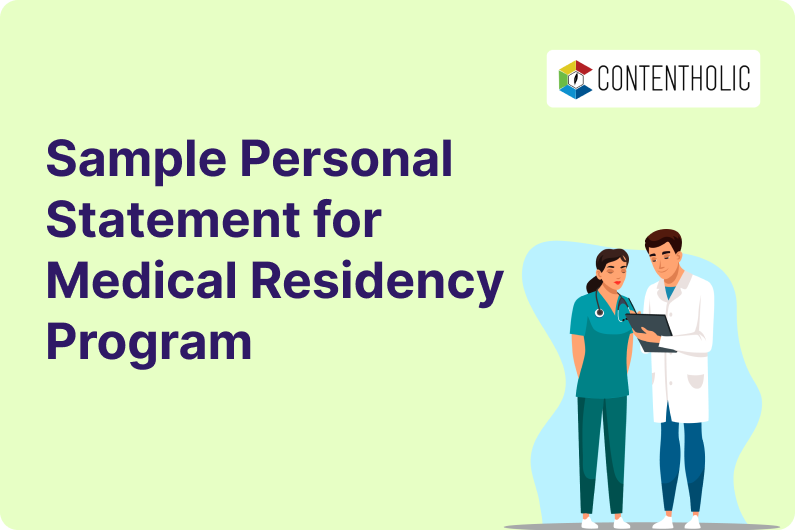‘Medicine is not just a profession, it’s a calling to serve humanity.’
The above quote aptly summarizes the noble profession of medicine. Doctors are among the most well-paid professionals. After finishing your MD or MBBS, you need to choose a specialty and become a part of a medical residency program. A medical residency program is a type of post-medical training program that enables you to gain clinical experience in a particular branch of medicine and obtain a medical license. How long does it take to finish a medical residency program? The medical residency program is for a period of three to seven years, depending on your chosen specialty and the country in which you are doing your program. Since there are many medical aspirants, universities have a very selective admission process. To ensure that the most deserving students get admission, a medical school/college asks students to write a personal statement. Just like your grades, the personal statement for residency that you would be asked to submit has an important role to play in your admission. What does one write in such a document? When you write a personal statement for a residency program, you have to describe your skills, interests, and academic and professional experiences in a way that shows your inclination toward pursuing a particular specialty, and how studying at a particular university will help you advance in your career.
Writing a Personal Statement for a Residency Program
First of all, you can find some of the sample residency personal statements online, and read a few of them. By reading such samples, you will get a basic idea of the format, language, and tone that are used while writing. It will also help you understand the way how other students have written their personal statements that led to their successful application. Most of the time, it has been seen that students don’t know how they should begin writing a personal statement. Well, you need to begin by writing an introduction that captures the attention of the reader. While reading some of the sample personal statements for residency programs, you will see that some students have started with an anecdote or mentioned a quote related to their interest in pursuing a particular specialty. To begin with, you could also do the same, but ensure that you bring out your perspective regarding the program.
After this, you can give a brief overview of your academic and professional details so far. While writing, include information about those experiences from your recent school or clinic years that help you grow personally and professionally. Then go on to write about the relevance and future demand of the specialty or mention its specific attributes. In a personal statement, while you write about such details, you should compose your thoughts in a way, that aligns with the curriculum of the specialty you are about to pursue.
Then you can go ahead and talk about the specific skills and qualities that you have that make you a prospective candidate for a medical residency program. Write about the various domains within your specialty that you are interested in studying. You can also describe some of your personal attributes that will help you undergo the rigorous residency training. Apart from this, you can also write about certain challenges that you faced, how you overcame them, and what did you get to learn from such experiences.
After this, you can write about your personal and professional goals. While writing about your career goals, you can give an insight into what sort of post-residency plans you have, and how this program will play an instrumental role in preparing you for these plans. It is always better that you provide a proper context. For instance, you can write about what kind of a setting you would like to practice in, whether rural or urban, or write about a particular community that you would like to work with, and how you wish to focus on improving their healthcare.
Apart from that, you can also talk about what kind of medical professional you would want to be, by writing about your personality traits, ethics, and values that make you a good fit for the residency program. Remember that the only way through which admission authorities can determine your worth for the program is when you reveal enough about your skills, interests, qualities, achievements, and future aspirations. This will give them an idea of what kind of a medical student you will be. Just like your introduction, your conclusion should also leave a lasting impression. You must provide an appropriate ending to the personal statement as well. You should end on a positive note, reaffirming your excitement for the program, how it provides you with an opportunity to grow, and how you look forward to contributing and becoming a part of the medical community.
Below is the Personal Statement Sample for Medical Residency Program
Have you ever had a moment that changed your life forever?
We are mostly driven by our parents, teachers, and mentors for our careers until some life-changing moments give us the motivation to choose a particular profession. For me, that occurred during my high school when a fellow high school classmate approached me to seek academic assistance. She was academically sound, but she was grappling with her health and kept on losing weight due to illness. While assisting him, I witnessed how challenging it was for her to manage her studies with health issues. She was very resilient and she shared that during her darkest moments, her physician was her unwavering support on her path to recovery. Not only did she excel academically that semester, but she also conquered the illness that had the potential to shatter her dreams. I was moved profoundly to witness the transformative power of medicine, which deeply motivated me to pursue medicine – a profession that could bring remarkable differences in people’s lives.
My interest in medicine only deepened as I progressed through medical school, especially after the clinical rotations and medical camps in different rural locations. I actively volunteered in community outreach programs and eventually, I got the role of community program coordinator. In this role, I collaborated with various departments to ensure the seamless planning and execution of these vital outreach programs. These experiences not only honed my skills to work effectively as a team but also developed my calling towards teaching and community outreach to positively impact the patient population in the community. My medical school had a tertiary care center catering to a wide patient population. I enjoyed the intellectual challenge of encountering the pathophysiology of multiple disorders that coexist in patients with multiple medical problems. I encountered several patients with internal medicine problems like heart disease, hypertension, diabetes, coronary disease, arrhythmias, etc. During this, I developed a deep interest in internal medicine.
Further, my internship in a busy COVID center consolidated my desire to pursue a career in internal medicine. The COVID-19 pandemic brought uncertainty that challenged the resilience of the entire medical community, including me as a novice medical intern. Caring for patients of all ages and backgrounds and witnessing the isolation and distress they experienced, deepened my determination to provide compassionate care. Managing patients with fluctuating oxygen levels and addressing their underlying chronic health conditions highlighted the intellectual challenges of comprehensive care. Being recognized with the “Humanitarian Award” for these efforts was an honor, but my real reward was the meaningful relationships I formed with my patients; relationships I cherish to this day. Finally, on the long road to achieving an effect of transformation on my patients, I realized that this was the kind of physician my high school friend had.
After months of chaos and an unprecedented situation the whole world faced, a sigh of relief came in the form of COVID-19 vaccines when the Indian Government rolled out the largest vaccination drive. But, I was taken aback by the reluctance of some communities to accept these vaccines. I did a research study in collaboration with other physicians to evaluate the barriers leading to vaccine hesitancy. With perseverance and effective communication, I was able to earn the trust of the communities and gathered valuable insights into their concerns and reservations. I learned to navigate through diversity and appreciate cultural sensitivity, while effectively conveying essential information. As a future internist, I am committed to empowering people through shared medical decision-making about their health.
In pursuit of excellence, I returned to Australia, where I spent my early childhood – a nation that has consistently pioneered in implementing groundbreaking innovations in healthcare. During my hands-on clinical externships in Australia, I was astonished by the exceptional care provided by physicians and the effective use of technology to improve patient outcomes. This experience reinforced my determination to be a part of this dynamic environment that fosters innovation and quality improvement while placing patients at the center of healthcare delivery.
Since my early education, I have been a consistent performer because of my passion for learning and I always obtained excellent grades. I was also elected as the school vice-captain and represented the school in state-level activities. For my active contribution to the school community, I was honored as the recipient of the “Young Achievers” award during my graduation. Beyond the realm of medicine, I enjoy gardening, I find immense joy in caring for plants and cultivating organic vegetables. My gardening pursuits have nurtured qualities of patience and attentiveness, which have proven to be vital in my medical profession.
I am eager to embark on this journey as an internal medicine resident physician, where I can upgrade my knowledge among the world’s leading medical practitioners. I look forward to this Australian Residency Program in Internal Medicine which offers a diverse clinical experience. It will help me develop the skills necessary to deliver high-value patient care. I am keen to pursue a career in academic medicine further and I believe this residency program would provide me with the essential momentum.
Download PDF
Conclusion
To sum up, a personal statement for the residency program should highlight your enthusiasm and reasons for participating. It should bring out the best in you by emphasizing your abilities, interests, experiences, and goals. In this manner the admissions committee will be able to understand your personality as a student and how you fit in with their medical school/college. If you feel that you are unable to put your thoughts into writing or lack a decent writing style, you can seek help from professional personal statement writers. We, at Contentholic, have a team of the best personal statement writers in India. Our writers have years of experience and have written personal statements for various courses and universities. Based on your academic and professional details, our writers will compose a well-structured personal statement for a residency program for you, that meets your expectations, and is as per the assigned format of the university you are applying for. If you wish to know more about the kind of content that we write, you can check our sample PDFs of personal statements. So, if you have any queries regarding the writing of a personal statement, feel free to contact us.
Frequently Asked Questions (FAQs)
1. What is a personal statement for a medical residency program?
In a personal statement for a medical residency program, you need to write about your background, experiences, and what motivated you to choose a particular specialty as a career option. It presents you with an opportunity to showcase your achievements, qualifications, clinical experiences, personal qualities, and career goals.
2. What are the best medical residency programs?
The best medical residency programs are offered by the following universities:
– John Hopkins University, USA
– University of Oxford, UK
– Imperial College London, UK
– Stanford University, USA
– Yale University, USA
3. Can I refer to a sample to write a personal statement for a residency program?
Yes, you can refer to a sample residency personal statement, as this will help you get a basic idea of the format, kind of language, and tone you should use while writing.
4. How can I get guidance regarding the writing of a personal statement from Contentholic?
Contentholic has a team of experienced writers who are well-versed in the nuances of writing personal statements for various courses and universities. Once you provide our writers with your academic and professional details, they will compose a well-written personal statement for you, that is as per the prescribed format and incorporates your needs and requirements.
5. Is a personal statement the same as an SOP?
No, the personal statement and SOP are not the same. However, these two terms are used quite interchangeably. In a personal statement, you provide an insight into your background, experiences, and what motivated you to pursue a particular field of study. It is about explaining “why you are the right candidate for the program.” On the other hand, in a statement of purpose (SOP) the focus is more on writing about your academic and professional goals, and how your qualifications align with the program that you are applying for. It is more about explaining “why you wish to study a particular program.”
6. Should I write about my research experience in a personal statement for a medical residency program?
Yes, you should write about your research experience in a personal statement for a residency program, especially if it is related to the specialty you are applying for. You can write as to how the research enhanced your existing knowledge about the medical profession and helped you develop the essential skills and competencies.
7. Can I find personal statements for residency examples online?
Yes, you can find several personal statements for residency examples online. For instance, you can check the following sample PDFs of personal statements.







